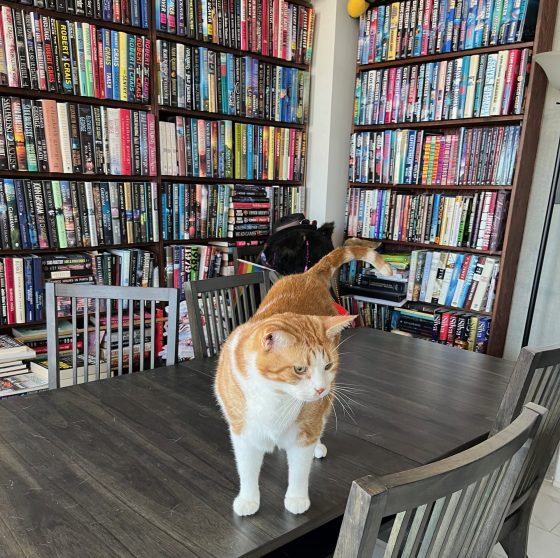I do most of my business writing on Patreon these days, but roughly once per month, I’ll put a post for free on this website. This post initially went live on my Patreon page on March 30, 2025. If you go to Patreon, you’ll find other posts like this one.
Putting Yourself Out There
I’m gearing back up to return to the university in the fall. After a heck of a couple of years, I’m resuming my very slow attempt to get a few extra college degrees. Mostly, it’s an excuse to listen to people much younger than myself learn cool stuff, and an excuse to listen to people somewhat younger than myself share their expertise.
I get inspired by all of that.
I’m searching class schedules and realizing that my Spanish has gotten rusty again, so there is probably a summertime online refresher in the complicated tenses on the horizon. Even though, really, using the proper tense is not my problem so much as finding the correct vocabulary word. As in any word that might suit in that circumstance. The vocabulary was the first thing to flee my brain in the hiatus.
The thing that fascinates me the most, though, is watching the theater kids, particularly those who are (at 18, 19, or 20) convinced they’re going to be Actors! (and yes, the exclamation point is there for a reason). Most won’t be, not because they’re not good enough, but because they don’t listen well and they already think they’re God’s gift to the profession.
Mostly, I watch the ones who are insecurely secure in their dreams. These kids know exactly what they want in their lives, but they’re not sure they’re good enough to get there, so they work extra hard to figure out where they should be.
Sometimes it is not where they expect to be. In the theater department in particular, they have to take courses in all aspects of theater, and they sometimes learn that they love a part of theater that they hadn’t expected to like at all.
Surprisingly enough to my younger self, the one who didn’t have the courage to follow her musical abilities into a music degree or to even walk into the theater department at the University of Wisconsin, there are a lot of introverts in theater. Some of those introverts are writers, yes, but many go onstage and perform. Most, in fact, because they like being someone else in front of a group. It’s safer for them.
I get safe. It makes sense. I also get the fear of doing something revealing in front of a crowd. Mostly, that fear is gone for me now. Years of public speaking and talking on panels at sf conventions eased my mind.
Still, I was pretty shocked when I learned that a lot of actors and musicians suffer severe stage fright—people you’ve all heard of. If they have to go onstage, they sit in the dressing room and shake, or, in some cases, puke, because they’re so scared.
Had I known that…well, I doubt I would have done it, because puking is not something I voluntarily do, even for art…but it certainly would have eased my mind about what for me is relatively minor stage fright (in comparison to what these folks have).
Really, though, it’s what they are willing to do for their dreams and their art. They put themselves out there. More importantly, they figure out how to put themselves out there.
Every year, I have a conversation with at least one of my writing students who is terrified for some reason I never probe of putting their work in front of an audience. It always boils down to the fact that they’re afraid of being seen.
Sidebar from a nearly 65-year-old person who has worked in the arts her entire life: You are never seen. Not in your entirety. You may reveal all of your secrets and no one will care. Or they’ll comment on the portrayal of something minor, like the cat, and kvetch about that. It’s disappointing…and freeing.
However, the fear of being seen is a real and crippling fear, stopping a lot of prose writers and poets from following their dreams. Writers, unlike actors and musicians, can hide from the world. You can use a pen name, set up a legal entity that doesn’t use your real name (in an obvious manner), and never let your picture out into the world.
You can hide and publish your work. That’s the great thing about being a writer.
Usually when a writer figures out their own personal workaround, they put their work on the market, whatever it means for them.
I had one of those discussions this past week with a couple of different writers, some in person, one online, and when I photo-bombed the Writers’ Block webinar on Wednesday.
After that moment on the webinar, I spent a few hours thinking about how universal that fear is among writers. I’ve been in this business almost fifty years now, and I’ve seen it every year.
Then Dean and I watched a little bit of The Voice. We often watch something to rest our poor brains, usually at dinner. We’ve moved away from news (since there’s no way that will relax anyone), and gone to documentaries and The Voice.
We usually watch a segment or two and then go back to whatever we were doing. It will take us days to watch an entire 2-hour episode.
So that Wednesday night, we watched two members of Michael Bublé’s team duet on a song he wrote, called “Home.” Most of you know it as a super hit for Blake Shelton, but Bublé wrote the song and released it first.
Before the battle, Bublé talked a bit about writing the song. I can’t find the clip for that (mostly because I’m lazy, but also because it’s not that relevant), but I did find the one that caught my attention.
It got me thinking, and I went up to my office and made a list.
Most people who work in the arts realize that their work has to be put out into the world.
- People who write music must perform that music to sell that song/sonata/whatever. They may be terrible singers. They might be shy as hell. But they need to make, at minimum, a demo tape.
Often they perform their own work, in some kind of concert, and it is that work that ends up catapulting them into whatever level of fame they will reach.
And then, partly because of the vagaries of the (exceedingly complex) music copyright laws, they may hear someone else cover their song. They might be like John Legend, who has said on The Voice that he cannot listen to a cover of one of his songs fairly. Or they might be like Bublé who not only assigned the song, but was honored by the way the singers performed it.
- People who write plays write them with production in mind. What is the point of writing a play if it’s just going to languish on your desk? The problem, though, with writing a play is that when it is performed, there will be an area that the performers cannot do or cannot say.
In early drafts of a play, the playwright will have to be nearby to do some kind of work to smooth out that section. Sometimes it’s because the star is a doofus and can’t say a word with more than two syllables, but mostly it’s because that section of the show, when performed in previews, did not work. Neil Simon deals with this a lot in his autobiography Rewrites.
- People who write screenplays know that they’re writing something that will be performed as well. I had a very famous writer friend who wrote the wordiest damn screenplays ever and had, in his contract, a clause that said not a word could be touched.
After his early years in Hollywood (when he didn’t have enough clout to have that stupid contract), he rarely sold a screenplay and when he did, it was a charity sale from a friend who would buy the screenplay so that the writer could retain his Writers Guild membership. (And then the charity friend would do a shooting script.)
- Artists know that their paintings or photographs will be displayed or used on covers or put on t-shirts and prints and everything else.
Even the lowest of the low, graffiti “artists,” the ones who deface buildings, understand that their art needs to be seen. (I’m grumpy about graffiti these days since Vegas has a lot of wall murals all over the city—and the freakin’ graffiti “artists” will deface them. Grrr. I hate people who deface other people’s art.)
- Even young poets these days understand that they might have to get up in front of a crowd at a poetry slam and declaim their poem.
- And let’s not talk about comedians, who are also writers, who get in front of a crowd, and risk bombing night after night after night. Dean and I saw one of George Carlin’s shows in his last years, and Carlin was testing material so new that he was holding paper torn from a notepad.
Some of it was funny. Much of it was not.
Fiction writers—people who write novels and short stories—are the only artists I know who expect someone else to publish their work. Fiction writers, particularly those who are traditionally published, believe that all they have to do is write it, and everyone will flock to their feet.
That’s an ingrained attitude, and a hard one to fight. Heck, a lot of these writers are worried when they decide to give a copy of their manuscript to an editor at a book publishing house or (worse) an agent.
Writers do not expect to have their work in the public view, and often fear it.
I’m not sure why this is. I think it’s just part of the culture.
There are movies that show writers at work, and someone else dragging that “brilliant” manuscript off the writer’s desk. Or the writer “gets discovered” in an English class (never happened when I was in school). Or someone else mailed off their manuscript.
That myth goes hand in hand with the idea that writing should be hard and writers should suffer while doing it. That myth also goes with the idea that anything written fast is terrible and anything labored over is brilliant. And that myth goes with the idea that being prolific is a sin. (Tell that to Charles Dickens and William Shakespeare.)
Indie writers have a similar problem, but it’s couched in other terms. I don’t want to learn how to publish. That’s going to be hard. It’ll take too much money or I can’t do covers or…or…
Okay, I want to reply, whatever roadblocks you want to set up for your work, go ahead.
But real artists—be they musicians or painters or (yes) writers—need to have their work seen. They need to figure out how to get on that stage despite their stage fright and put their art in front of an audience.
Otherwise the art will be destroyed when they die, tossed out with the trash or deleted off their computers.
Oh…and let’s talk “covers” for a minute. Blake Shelton’s version of “Home” is very different from Bublé’s version, which is different from the duet that aired on The Voice this past week.
If you’re lucky as a writer, and if you put yourself out there, at some point, someone will want to do make another piece of art using yours as inspiration. Maybe a movie, maybe a TV show, maybe a dramatic reading or an audio book.
That’s a “cover” for lack of a better term. (It really is a derivative work, and it does fall in a different place in the copyright law, but go with me on this for a minute.) Instead of being all protective and saying that you must control all things, say yes…if the contract terms are good.
That’s all.
A singer doesn’t have to get permission to cover a song. I can sing “Home” badly in front of an audience if I want to, but if I get paid for it, I need to let the songwriter know that I’m going to be covering the song. The songwriter cannot say no.
It gets complicated after that. (Okay, it’s already complicated.) But implied in all of this is that the music needs to get in front of an audience. The play will be performed. The screenplay will become the basis for a movie. The painting will hang on a gallery wall.
What makes writer-artists any different? Why should we fight so hard to create something and then be afraid to put it in front of an audience. Particularly since we’ll never see that audience. We don’t have to hear from them either, if we keep our email private and don’t go on social media and don’t read reviews.
What makes fiction writers so dang delicate? Every artist has fears. All of us do. If we want to make a living at our art, we learn to overcome the fear.
It may take a dozen workarounds. It might mean the writing equivalent of puking in the bathroom before stepping on the stage. But if you value your own work and your own dreams, you learn how to get past whatever is stopping you.
Just like other performers do.
“Putting Yourself Out There,” copyright © 2025 by Kristine Kathryn Rusch. Picture of Gavin is there because, despite appearances, he’s terrified of putting himself out there.






Cool article Kris. One element that I wonder about sometimes is if some of the obstacles is something akin to different types of failure in another realm. My day job has me looking at the labour market / employment obstacles for individuals (and groups). Some of the failures include:
a. Failure to learn — sometimes structural, sometimes the wrong teacher, often a barrier unique to the individual, but whatever it is, when an opportunity presents itself, they’re not ready;
b. Failure to launch — these are often people who finish high school (or are finished with high school at least) and failed to transition into ongoing regular employment or school…they often don’t have the credentials/GED or are short in some skills or just missed an opportunity they didn’t see;
c. Failure to transition — going from one type of job to another, they fail to transition their skills from one domain to another.
etc
etc
etc
But I often wonder if that last one is like the actors. They can do one part of the job — acting — but can’t seem to handle the other part of the job i.e., preparing and handling stress outside of the moment. The skills they have in one area are not ones they capitalize in the other.
I’ve experienced the same myself, in some ways. At work, I write stuff all day long. That’s the job. It gets circulated for comment to tons of people for input/criticism/suggestions/revision. We don’t OWN our products much. But when I was at home, my personal writing? I wasn’t comfortable sharing with too many people. Until I started to blog. Now, anyone can read my stuff anytime they want. I’m not afraid to show anything to anyone. I’ve kicked out almost 2M words on my blog about tons of stuff, even extremely personal stuff I was dealing with. It’s like a personal diary online. I’m not afraid to share much these days, unless it involves other people and I’m telling their story instead of my own. Non-fiction does not phase me at all. Fiction, on the other hand, I’m not as open. I haven’t translated the skills over yet. Failure to transition, failure to capitalize, perhaps.
I’ve found a motivating way to get my work out there, and that’s posting chapters, as I finish them, up on Royal Road. First drafts, full of typos, just getting it up there. The next day I do my run through of the previous day’s writing, fixing the typos, removing double words etc… I update it on Royal Road, then get the day’s chapter done, and throw it up there at the end of the night.
It’s motivating because I have eager readers wanting to read everything I write as soon as I write it. If I let things slide then I’ve a disgruntled readership. And it gets over the fear of quality and writing fast because readers love the raw drafts… and some have learned to stop at the second to last chapter to give me time to do my copy edit.
Why don’t I copy edit before I post? Because the first draft is good already. And getting the chapter out to readers is the most important thing – they’re eager for it even in an imperfect form. And on Royal Road typos are almost expected and catching them is part of the reader-writer engagement process though the comments on each chapter.
It works for me. Motivating and engaging. Try it.